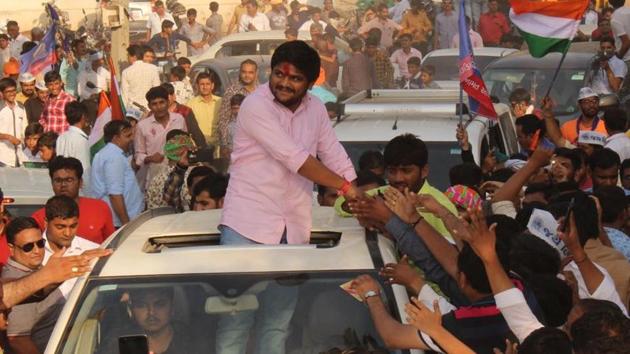Gujarat elections a test of Hardik Patel’s popularity and Amit Shah’s micro-management
The Patidar vote will be decisive in nearly 20 of the 89 assembly seats which will see voting in the first phase of the Gujarat elections on Saturday.
As Gujarat gears up for polling on Saturday, the high-decibel campaigns by Prime Minister Narendra Modi and Congress vice-president Rahul Gandhi stood out as huge crowd-pullers in the first phase.

But it is the battle between young Patidar leader Hardik Patel’s popularity and BJP president Amit Shah’s micro-level management that holds the key.
Gandhi’s aggressive and extensive canvassing has rejuvenated the Congress, which also got a shot in the arm with Hardik’s Patidar Anamat Andolan Samiti (PAAS) declaring support for the party. The 24-year-old quota crusader has turned out to be the star campaigner in this election. He not only pulled huge crowds on the ground, but was also a big draw on social media.
“The Congress could not do much on its own as it lacks a strong network in Gujarat. But it remains to be seen if the large crowds at Hardik’s rallies will translate into votes. Patidars are not happy with the BJP, but the party’s organisation is very strong and Shah has tried to strengthen it,” said political analyst Hari Desai.
On the last day of campaigning when Hardik was addressing a huge gathering in Bhavnagar, the BJP released photos of a meeting between its state unit president Jitu Vaghani and Shree Khodaldham Trustee Naresh Patel. A seat of the Patidars’ deity, the Shree Khodaldham Trust wields considerable influence among the Patels. The BJP also spread the word that the trustee appealed to the community to vote for the ruling party, but this was soon denied by trust.
The rebellion by the Patidars is the talk of this election as they formed the bulwark of the BJP’s support base in Gujarat for over two decades.
The Patidar vote will be decisive in nearly 20 of the 89 assembly seats going to polls on Saturday. But experts feel the community may end up as a divided house given that Hardik has put the OBC status demand on the backburner. His speeches now mostly talk about uprooting “BJP that killed and beat up agitating youths”.
With the Patidars posing a challenge for the ruling BJP, already battling anti-incumbency after its 22-year rule, Shah remained focused on mobilising grassroots workers. He began addressing rallies only a week ahead of polling. Before that, Shah concentrated on strengthening the nearly 55,000 booth-level committees across the state in two phases.
Modi, initially, had to defend his economic reforms after Gandhi wove his campaigns around the seemingly negative perception of demonetisation and GST among Gujarati traders.
But the PM got the much-needed ammo on the last day of campaigning to turn the election into a battle of ”Gujarati asmita (pride) vs Mughlai saltanati mindset” of the Congress after its senior leader Mani Shankar Aiyar called him a “neech aadmi”. It was Modi’s last rally for the first phase.
While Gandhi’s visit to over 20 temples was seen as his ‘soft Hindutva approach’, minorities – especially Muslims who were at the center of narratives in previous polls – were largely ignored by the parties. Rather, the rise of young leaders like Hardik (Patidar), Alpesh Thakor (OBC) and Jignesh Mevani (Dalit), brought the caste factor back into play in Gujarat politics after decades.





